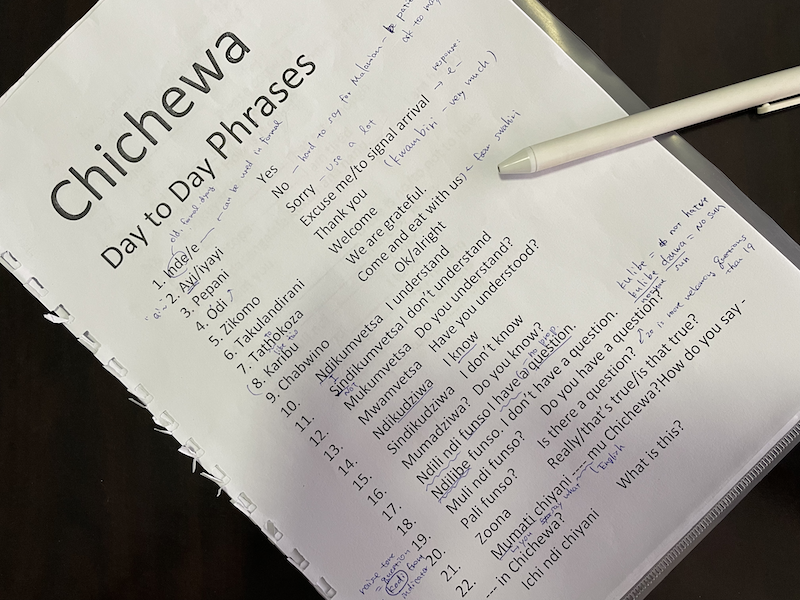Muli bwanji? ("How are you?" in a polite way, in Malawi's local language called Chichewa)
A police, immigration, or military personnel asks.
If you respond Ndili bwino. Kaya inu? ("I'm fine. And you?"), they smile. If you reply in English with confusion, like Ah...hello? there is a higher chance that the personnel will ask you to show your passport and explain what you are doing here.
Language is more than an interface to exchange semantics. It tells a lot more about the contexts, such as your identity, mood, and status. I recently learned that the Malawian officers try to efficiently read this information by greeting in the local language, even if they can speak English fluently. Thus, if we could understand and speak a local language, we could be united stronger. Otherwise, there will be more tension and hassle.
Languages represent the power
This experience reminds me of the history of the world's most widely spoken constructed language, Esperanto; it is recorded that its creator L. L. Zamenhof worked on the language to foster harmony between people from different countries. Eventually, language is the foundation of humanity.
However, the reality is that there is no single language that everyone on the earth can understand, and considering English is one of the most widely spoken languages1, those who only speak their non-English local language may have a disadvantage in the global economy, or vice versa. To give an example, none of my close family members in Japan can speak English, and hence their socio-economic opportunities outside of the country would be limited due to the language barrier. On the other hand, foreigners traveling to Japan are often struggling with communicating with locals as they don't know how to speak Japanese. Meanwhile, I felt "sorry" countless times whenever I had to speak to French-speaking Swiss or Canadian people in English, or there was no way to interact with locals in some Asian, African, and Latin American countries, for example.
The point is that your ability to manipulate certain language(s) could determine the power you hold. The lack of access to the languages can weaken the presence of certain populations in a global society because the inaccessibility implies the impossibility of "decoding" all the information the languages implicitly package.
Furthermore, a language embodies information not only about yourself but also about history, culture, and people who have been centered around the language. As a Canadian permanent resident, this topic is particularly sensitive. For instance, Indigenous knowledge is hard to transfer to the next generations as their traditional languages become spoken less ever since colonialism2. Or, significantly less representation of French-speaking populations in the "bilingual country" has been a big challenge for them3.
 * Example of Canada's English-centered "bilingualism." The government signs (right bottom, green one) are always written both in English and French, whereas many local signs in western Canada, where English is the provinces' official language, are often written only in English.
* Example of Canada's English-centered "bilingualism." The government signs (right bottom, green one) are always written both in English and French, whereas many local signs in western Canada, where English is the provinces' official language, are often written only in English.
Language in the digital world
After all, underrepresented languages can be overlooked by the majority, and it leads the relevant information and underlying contexts to disappear quite easily. Importantly, the speed at which the popularity of languages shapes the power dynamics in the whole world has increased at a dramatic pace thanks to information technologies. Because English is the most popular language, you can easily find critical information on Google, unlike a Chichewa speaker who cannot fluently read and write in English. What if the information you are looking for is about health or business practices, which could impact your entire life? Even domestically, I'd imagine that Malawians who are exposed to English-speaking culture more frequently can be richer than those who only perceive the world in Chichewa.
 * In my neighborhood in Malawi, signs at a public library, as well as a flyer for the government-led digital transformation project, are written only in English. Under the environment, how can people who have limited ability to manipulate English study new knowledge and skills, and participate in digital economy?
* In my neighborhood in Malawi, signs at a public library, as well as a flyer for the government-led digital transformation project, are written only in English. Under the environment, how can people who have limited ability to manipulate English study new knowledge and skills, and participate in digital economy?
You may wonder if AI can fix this issue because of advanced machine translation. Well, it could be true if your language were popular enough, such as French, Spanish, or Mandarin Chinese. However, minority languages like Chichewa may not benefit from the technological evolutions.
The foundation of AI-like information systems is data, and we feed an astronomical amount of data to computer programs so they capture the patterns and automatically accomplish similar tasks in the future. In the case of Large Language Models (LLMs), as the name suggests, the volume of language data would determine how "powerful" the AI systems can be, and hence underrepresented languages or small organizations that have less power to manipulate massive data can naturally be at a difficult position in competitions. I discussed the point in Three Perspectives on Large Language Models and Their Emerging Applications.
So, how are my Chichewa-speaking friends represented in the era of ICT? Ask ChatGPT (GPT-3.5): How big is your Chichewa corpus compared to English?
I don't have access to specific statistics regarding the size of my corpus for individual languages like Chichewa compared to English. My training includes a diverse range of languages, but the majority of the data is in English due to its prevalence in digital sources. As a result, I may have less exposure to less commonly spoken languages like Chichewa. However, I've been trained on a vast dataset to assist with various languages and topics to the best of my ability.
Yes, "the majority of the data is in English due to its prevalence in digital sources," and the system "may have less exposure to less commonly spoken languages like Chichewa."
The future of minority languages
Therefore, Chichewa is indeed underrepresented not only in the physical but digital world, and their presence will become smaller and smaller as such informational systems penetrate the people who already have the power in an English-speaking global society. Note that there are more than 10 languages in Malawi4, and people who speak non-Chichewa local languages are worse in terms of their presence on the internet.
Of course, the data volume is not zero, and for example, there is a Chichewa-English machine translator that's impossible to develop without having a certain volume of data holding pairs of words/sentences between both languages. I can study Chichewa thanks to these applications. However, you may notice that the experience is hardly comparable to sophisticated options available only for more popular languages, like Google Translate; the under-resourced translator is very slow and stops working as soon as you throw a complex long sentence.
This illustrates the phenomenon that the rich get richer, and the marginalized population becomes more marginalized. Due to the power dynamics associated with the availability of language data, the English-dominated digital world simply amplifies the existing power in our society, which can be skewed largely towards English-speaking people (e.g., US-based tech companies), while suppressing the presence of other, especially minority, languages. That's also why the US is still ahead of China at least in the competition of language AI development; we have more quality English data than Chinese on the internet.
In practice, what I can do who care about the information associated with minority languages is to sensitize myself to the languages. Chichewa or Tumbuka in Malawi, and French or Indigenous languages in Canada, for example. My ultimate objective this year is to be conversational in Chichewa, and if I were to apply for Canadian citizenship, I would attempt to satisfy my language eligibility requirement in French, not English.
 * With the notes from a 2-hour Chichewa crash course we took during the first week of volunteer assignment, I accumulate new vocabularies and practice them "pang'ono pang'ono" ("little by little" in Chichewa). Currently, I can do the basic greetings and some self-expressions, as well as an end-to-end small interaction for shopping, but I must admit it's still far from being conversational.
* With the notes from a 2-hour Chichewa crash course we took during the first week of volunteer assignment, I accumulate new vocabularies and practice them "pang'ono pang'ono" ("little by little" in Chichewa). Currently, I can do the basic greetings and some self-expressions, as well as an end-to-end small interaction for shopping, but I must admit it's still far from being conversational.
At an institutional level, adding data points to the digital archive always means something, especially when it's a quality text such as news articles and research papers. Or, organizations can invest more in multilingual communications (e.g., on social media posts, publications, and in-person programs) as a means to reach wider populations, including those who are most vulnerable and in need of interventions. Whether intentionally or unintentionally, we should never ignore and suppress minorities by default.
1. The most spoken languages worldwide in 2023. ↩
2. Statistics Canada's report Indigenous languages across Canada begins with a statement as "Indigenous peoples have consistently stressed the importance of language as the primary tool to share and communicate culture, world views and values to future generations." ↩
3. As Francophone minority communities face significant economic and demographic challenges in Canada, "Towards the Re-establishment of the Demographic Weight of Francophones" has been planned out as a part of the Government of Canada's Action Plan for Official Languages 2023–2028. ↩
4. Although different reports introduce a different set of languages (e.g., The Culture of Malawi: Languages of Malawi, Language data for Malawi), it is evident that Malawi is shaped by diverse groups of people speaking variety of languages. Meanwhile, it is disappointing to see the government's immigration department lists only four of them as "List of Languages in Malawi"; where are your people who speak the other languages? ↩This article is part of the series: Digital Malawi: Developing Hope in the Information Age How to Talk About AI
Share
Categories
See also
- 2024-06-24
- The End of the Beginning—What I Talk About When I Talk About Malawi
- 2023-09-08
- Definition, Role, and Current Status of Digital Literacy in Malawi #LiteracyDay
- 2023-08-23
- Starting Field Study on How Information Flows in Malawi
Last updated: 2024-03-22
Author: Takuya Kitazawa
Takuya Kitazawa is a freelance software developer based in British Columbia, Canada. As a technologist specializing in AI and data-driven solutions, he has worked globally at Big Tech and start-up companies for a decade. At the intersection of tech and society, he is passionate about promoting the ethical use of information technologies through his mentoring, business consultation, and public engagement activities. See CV for more information, or contact at [email protected].
Now Gift a cup of coffeeDisclaimer
- Opinions are my own and do not represent the views of organizations I am/was belonging to.
- I am doing my best to ensure the accuracy and fair use of the information. However, there might be some errors, outdated information, or biased subjective statements because the main purpose of this blog is to jot down my personal thoughts as soon as possible before conducting an extensive investigation. Visitors understand the limitations and rely on any information at their own risk.
- That said, if there is any issue with the content, please contact me so I can take the necessary action.